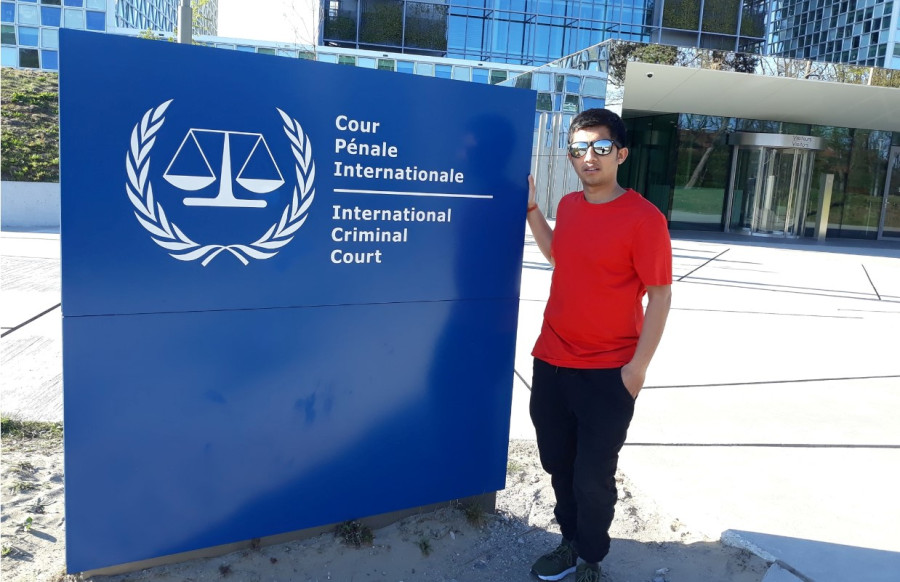National
Former child soldier files petition at UN Human Rights Office demanding justice
Lenin Bista has asked the UN to place pressure on the Nepal government to address the demands of child soldiers, who have been largely left out of the transitional justice process
Binod Ghimire
Lenin Bista, a former Maoist child soldier, has petitioned the United Nations Office of the High Commissioner for Human Rights in Geneva demanding justice for the thousands of former child soldiers who have been largely left out of the transitional justice process.
The petition, submitted on Thursday, seeks UN support to asking the Nepal government to prioritise justice for former child soldiers, recalling that a serious crime was committed against the thousands of minors forced to fight on behalf of the Communist Party of Nepal-Maoist during the 10-year armed insurgency.
The petition was filed just as Prime Minister KP Sharma Oli embarks on a three-country Europe sojourn that includes a visit to Geneva to mark the centenary of the International Labour Organisation.
Bista has been in Europe for over two months now, meeting with officials from the United Nations and other international human rights organisations, seeking solidarity in his fight for justice for child soldiers.
Bista is president of the Peace Envisioners Nepal, formerly known as Discharged People’s Liberation Army of Nepal, an organisation working for the rights of Maoist combatants disqualified in the army integration process that saw former Maoist soldiers merged with the Nepal Army.
The application seeks the assistance of special rapporteurs to recommend that the Nepal government provide compensation for discharged combatants like Bista, and a public apology from the United Nations Mission in Nepal (UNMIN), the Nepal government, and Maoist leaders who denied them compensation.
“We also ask the leaders of the former Maoist Party for public apology for using under-age children as combatants,” reads the application.
Thousands of Maoist fighters like Bista had been disqualified for being minors during the verification process conducted by UNMIN in 2007. Among the 4,008 disqualified combatants, 2,973 were minors while the remaining 1,035 had joined the Maoist People’s Liberation Army after the first ceasefire of May 26, 2006 — six months before the peace deal was signed. The government had provided between Rs 500,000 and Rs 800,000 for the combatants who chose voluntary retirement. However, those who were disqualified didn’t receive any substantial support, except for a few thousand rupees from the United Nations.
Speaking to the Post from Geneva, Bista said he was able to draw the attention of the UN and international human rights organisations regarding former child soldiers who have been neglected by the Nepal government.
“I believe that our issue will be raised together with other victims of the decade-long insurgency,” he said over telephone.
Former child soldiers have been demanding special social and economic assistance given that they were robbed of an education by their conscription into the rebel army. They’ve also asked for medical treatment, psychosocial counseling and special support schemes for injured, mentally ill, and disabled former child soldiers.
However, the prevailing transitional justice law has no such provisions, and neither have international human rights organisations raised these concerns.
Charan Prasai, a human rights activist, said that Bista had taken the right step to mainstream the concerns of former child soldiers. “This is definitely going to build pressure on the Nepal government to act towards providing justice for former minor combatants,” Prasai told the Post.
Bista, in the second week of April, submitted a similar application to Virginia Gamba, special representative of the UN Secretary General for Children and Armed Conflict, in Belgium.
Among the seven special human rights rapporteurs who received Bista’s petition this time around, five had written to the Nepal government in April asking for transparency in the ongoing transitional justice process.
The Nepal government, on August 24 last year, had stopped Bista from visiting Thailand on the grounds that he would raise the issues of child soldiers in international forums. Bista was scheduled to make a presentation at a workshop on ‘Youth in Conflict Areas: Healing and Peace-building through Social Engagement’




 10.12°C Kathmandu
10.12°C Kathmandu















